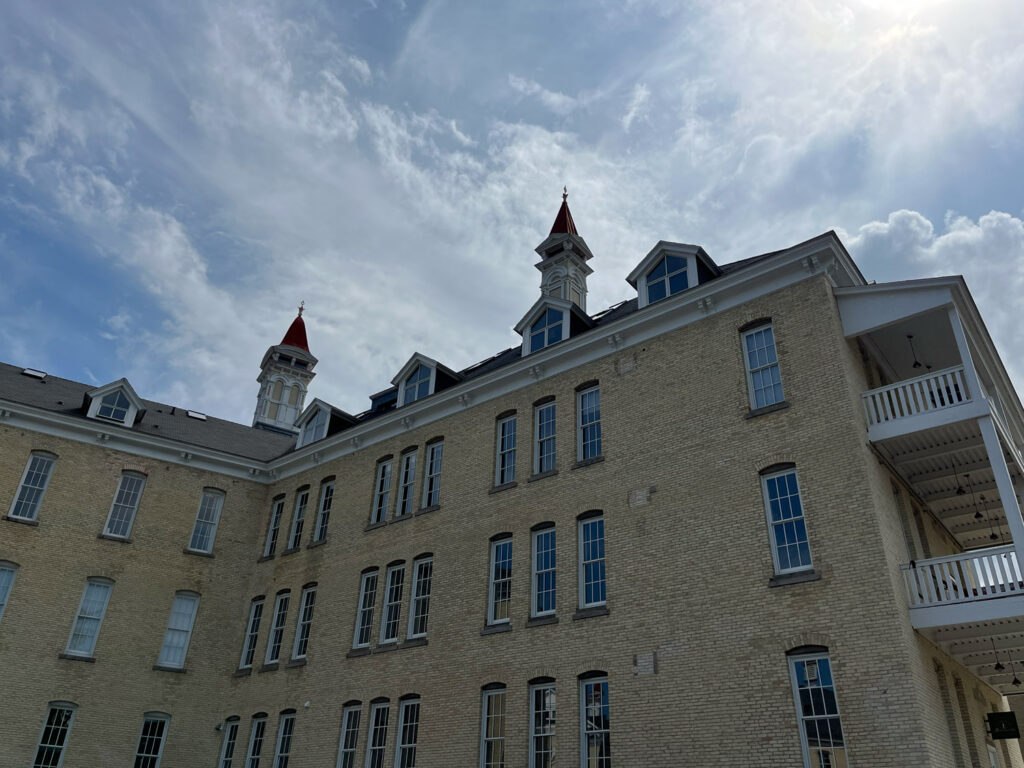In July, 11 people were stabbed while shopping at a Walmart near Traverse City by a man with a significant history of mental illness. Bradford James Gille was previously ordered by a court to be treated at the Michigan Center for Forensic Psychiatry in Saline.
Unfortunately, a shortage of inpatient mental health facilities throughout the state have left him and others without options to receive the mental help they need. If Gille had been in crisis prior to 1989, help would have been around the corner.
Just outside of Traverse City lies a sprawling campus of crumbling buildings which have been partially renovated into luxury condos, shops, and restaurants by a private developer. It’s now known as the Village at Grand Commons.
For many years, it served as the area’s largest employer and housed over 3,000 patients when it operated as the Northern Michigan Asylum, also known as the Traverse City State Hospital.
Founded by Dr. James Decker Munson in 1881, the asylum was built on his “beauty is therapy” principle that patients could have a place in a beautiful surrounding to rehabilitate. Later, patients could learn trade skills such as farming, construction, and sewing.
The facility gave patients a sense of purpose and dignity in a beautiful surrounding. Most importantly, it allowed many of them to re-enter society safely and kept themselves and communities from further harm.
Unfortunately, as the years passed, views on psychiatry shifted away from beauty, purpose, and dignity, as many institutions replaced mental health care with reliance on now discredited shock therapies that seem closer to torture and led to a national push for deinstitutionalization.
Due to a national shift to deinstitutionalization under the Community Mental Health Act of 1963, the Northern Michigan Hospital was closed in 1989 and sat vacant for a number of decades until a private development firm purchased the property in the early 2000s and slowly began repurposing it.
The main building serves as a condominium, with restaurants, shops, tours, and an event venue, while many other buildings on the extensive property sit in decline, an eerie tribute to the 50,000 patients hospitalized over decades.
Michigan had at least 16 mental health facilities before deinstitutionalization. Most Michigan psychiatric facilities have been closed or demolished. Many of these buildings, like the former Northern Michigan State Hospital, sit vacant or are becoming privately owned developments.
In an oversight hearing last month, Michigan Department of Health and Human Services Director Elizabeth Hertel was asked about hospital beds for psychiatric services.
When Representative Matthew Bierlein asked about state run psychiatric services in the state of Michigan, Hertel said MDHHS doesn’t want to do it.
“It’s our preference not to expand our state footprint,” Hertel said. “The reason for that is it’s incredibly difficult for us to recruit and retain staff with the salary levels that we have. It’s easier for the private sector, because they can pay more than we can.
“However, if the desire is for the state to expand its footprint on inpatient psychiatric beds, I think that’s something we’d be willing to discuss,” Hertel added.
Hertel’s claim conflicts with a statement by House Oversight Chair Jay DeBoyer.
DeBoyer said that under Hertel’s leadership MDHHS has had a 2,000% increase in the number of people at MDHHS making over $100,000 a year.
Hertel can afford to staff and pay her own agency and nonprofit but allegedly cannot provide adequate mental health services for the State of Michigan?
MDHHS received $35.6 billion in 2024. Its funding has been the subject of numerous allegations of waste, fraud, and abuse, including:
- Investigations regarding the agency’s failure to protect children
- $176 million diverted to a nonprofit directed by Elizabeth Hertel
- Allegations of abuse at the few remaining state-run psychiatric facilities
- Excessive SNAP, welfare, and benefit fraud allegations
Total nonprofit spending by MDHHS in 2024 was over $6.3 billion, with many funds going to woke initiatives and other DEI programming.
At least one Michigan candidate for governor is prioritizing a new approach to addressing mental health in Michigan. Congressman John James recently said our institutions can’t help those in crisis.
“Our schools, our hospitals, and our jails are not configured to deal with the special needs of folks who are struggling with mental health,” James told Clay Travis in an interview.
He went on to say one of the most important goals he has is to “restore hope in the State of Michigan, restore trust in the State of Michigan, restore wellness in the State of Michigan, restore family values in the State of Michigan, and… restore beauty.”
I think Dr. Munson would agree with that worthy goal.
Michiganders are experiencing a mental health crisis and a lack of options to keep themselves, their loved ones, and our communities safe.
We once had the facilities to properly address these issues. Defund the network of nonprofits and phantom jobs and focus on reopening updated mental health facilities to make Michigan safe again.
Anna Hoffman is a hockey mom of three living in Ann Arbor. Follow her on X @shoesonplease.



